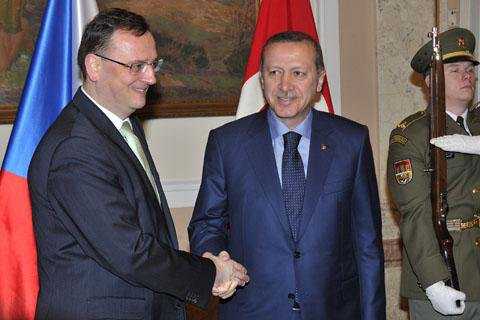Editor’s Note: The following report is excerpted from Joseph Farah’s G2 Bulletin, the premium online newsletter published by the founder of WND. Subscriptions are $99 a year or, for monthly trials, just $9.95 per month for credit card users, and provide instant access for the complete reports.
WASHINGTON – Turkey is no closer to membership in the European Union now than when it first applied in 1959 and instead it is looking eastward to join the Shanghai Cooperation Organization out of total exasperation, according to a report in Joseph Farah’s G2 Bulletin.
The SCO is comprised of Russia, China, Kazakhstan, Kyrgyzstan and Tajikistan.
Turkey, which is a long-standing member of the North Atlantic Treaty Organization, or NATO, still holds out faint hope of joining the E.U.
The reality, however, is that fellow NATO members Germany, France and Greece have opposed Ankara’s membership, even though Turkey can ship its products duty-free to E.U. nations under a prior arrangement but people sending the products still need to file for a visa.
Turkey hopes to allow its citizens to enter into E.U. countries under the Schengen Treaty, which allows E.U. members to travel among the E.U. member countries without a visa.
“There is one issue that has been on top of our agenda still pending to be resolved,” said Egemen Bagis, Turkey’s Minister for E.U. relations, “the Schengen visa preventing the free travel of Turkish citizens.”
“It is not fair,” he said. “Turkey is the only E.U. candidate country, whose citizens are still subject to visas. Turkey is the only country that had formed a Customs Union with the E.U. without becoming a member. The products of Turkish businessmen can freely flow into the Union, but the owners of those products cannot freely travel.”
Bagis said that Turkey still seeks membership. However, the E. U. “actually wants to forget us. We are not the ones that are undecided – the European Union is. Whereas, if they would just reveal their true intentions to us, we would be at ease. We could just look after our own business and go our own way. The European Union needs to stop stalling us.”
Turkey’s total exasperation recently was exhibited by Turkish Prime Minister Recep Tayyip Erdogan.
“I told Russian President (Vladimir) Putin, ‘You should include us in the Shanghai Five and we will say farewell to the European Union.’”
Separately, Erdogen let his feelings be known that the SCO “is better and more powerful, and we have common values with them. We told them ‘if you say come, we will.’ Pakistan wants to join, as does India. They have also made requests. We could all join together. In terms of population and markets, the organization significantly surpasses the European Union in every way.”
Some observers believe Erdogan is using the SCO as leverage to get into the E.U. Others aren’t so sure. They point to the fact that Erdogan has made such statements in the past.
Given the E.U.’s economic problems, Erdogan may be looking to the developing markets such as China and India for future opportunities. Turkey’s membership would especially be an asset to China and Russia, which would have greater access to Western technology as a result of Turkey being a NATO member.
For Turkey, this arrangement also would be of political benefit since it would be able to reassert its influence in a fast-expanding market of Central and East Asian countries, where Turkey under the Ottoman Empire asserted great influence.
Keep in touch with the most important breaking news stories about critical developments around the globe with Joseph Farah’s G2 Bulletin, the premium, online intelligence news source edited and published by the founder of WND.
For the complete report and full immediate access to Joseph Farah’s G2 Bulletin, subscribe now.
via Turkey looking at EU alternative.




